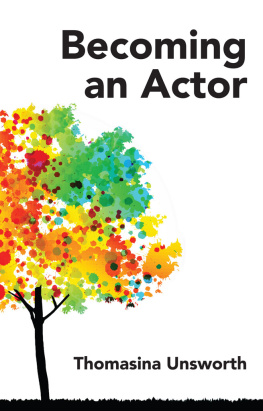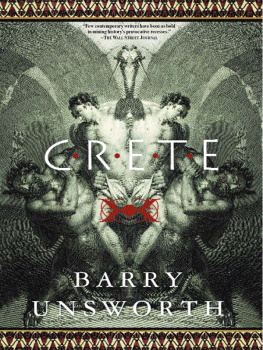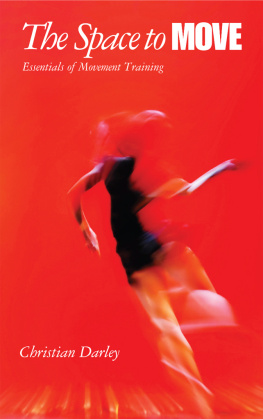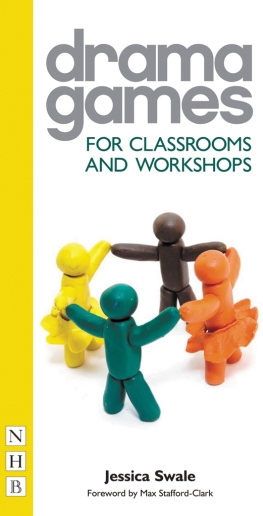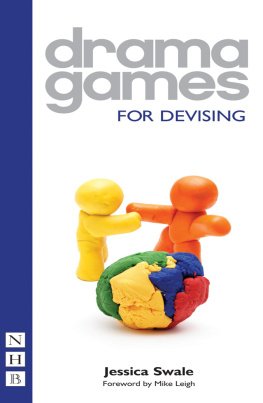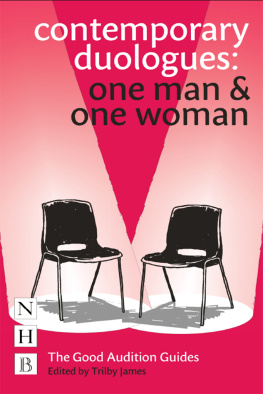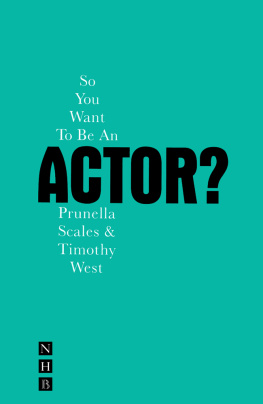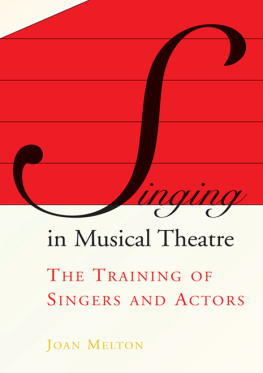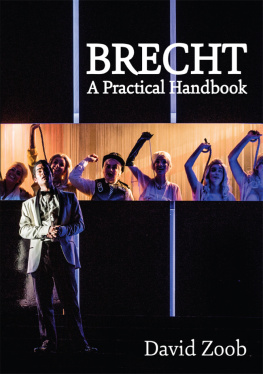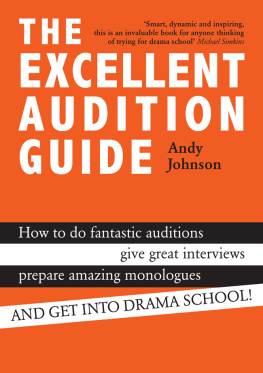Becoming an Actor
Thomasina Unsworth

NICK HERN BOOKS
London
www.nickhernbooks.co.uk
For Isobel and Esme
Acknowledgements
In writing this book I have drawn on the experience and expertise of a number of practitioners; thank you for giving me your valuable time in answering questions and discussing exercises. My colleagues at Rose Bruford College have been a great resource; Iain Reekie, Jeremy Harrison, Julian Jones, Alison MacKinnon, David Zoob, Pat OToole, Tess Dignan and Peter Bramley, I have involved you all at some point in this process. Thank you too to Nesta Jones for her support throughout, and to Michael Earley for his help and encouragement. I am very grateful to everyone who contributed to this book, generously offering advice despite hectic workloads: Sooki McShane, Carolyn McLeod, Phillipa Howell, Simon Stephens, Matt Wilde, Paul Whittington, Richard Eyre, Mary FitzGerald, Grant Parsons, Charlotte Jones, Paul Baizley, Colin Hurley, Fiona Dunn and in particular Simon McLindon. I have talked to too many students to name in person, but I am indebted to all of you, not just for your input here, but also for making my job the pleasure that it is.
Many readers will recognise some of the exercises in this book. They are my own distillation of exercises gleaned over the years. Some I have my own drama-school teachers to thank for, others I have discovered further along the line through rehearsals and workshops. Some are adaptations of exercises first put into print by practitioners such as Bella Merlin, Sanford Meisner and Cicely Berry, but may well have been used by actors, teachers and directors before then. I owe a great deal to their inspirational work.
A huge thank-you to Nick Hern and Matt Applewhite.
Introduction
If you are reading this book, there is a good chance that you are thinking of auditioning for drama school. It costs money to attend the rounds of auditions at the top schools and it also takes nerve. You have to stand in front of a panel of people, some of whom may look less than enthusiastic, and convince them of your talent. You will have to show that you have a voice and body that are trainable, that you are responsive and flexible, that you are passionate about what you do, that you are creative and imaginative. You will have to give them a very good reason to select you out of the thousands of applicants auditioning every single year. Each drama school sees well over two thousand hopefuls, and from these they make roughly thirty offers. So behind each person given a place stands a long queue of people wishing that they had been chosen instead. Perhaps if you had only been toying with the idea of trying out for drama school, this paragraph will put you off. If it does then you have had a narrow escape. Auditioning is not for the faint-hearted. You need to want to train as an actor more than anything else in the world in order to endure the experience.
Let us assume that it hasnt deterred you, or perhaps you have already been accepted on to a course. You are, no doubt, aware of what a difficult career you will be preparing for. There are many statistics available showing the awfully small percentage of actors that are in work at any given time; such figures make depressing reading. A large number of those who train face unemployment, others find work for a year or two, perhaps in a soap opera, but then struggle to get another job when their contract has expired. For a fortunate few, long and interesting careers await them. You cannot see into the future, and no one can predict with any certainty how an actors working life will develop. What you can do is value your training for its own sake and be as prepared as possible for the years beyond it.
Have you any idea what it might actually be like studying at a drama school? When I went to college I felt unprepared, and I wished that I had been better informed. I arrived with lots of preconceptions about what the experience would be and was bewildered initially by how different the reality of the training was in comparison to my fantasy version of it. Had I been better informed, I think I might have got a lot more out of my training. Similarly, when I first went out into the business I was unaware of how much I needed to market myself, or how to deal with various professional situations as they arose. It was tougher than it needed to be.
The aim of this book, then, is not to put you off, because training to be an actor is a wonderful, creative, important thing. The years you spend at a drama school will change you in ways that you could not have foreseen. They will develop your talent, challenge your thinking and nurture your spirit. The years beyond drama school will take you on further adventures. My intention, rather, is to give you a glimpse of what acting classes at an accredited drama school might be like, and to offer you guidance through them and into your first year after graduation. Each school will have its own emphasis and ethos. Its up to you to find out all that you can about each one, before deciding where to apply, or indeed where to attend. I have not taught in every drama school in the land and I am not privy to every eventuality that you might face after you have trained. However, having researched and met with practitioners and industry professionals, I am confident that this book will give you a fair sense of the sorts of exercises that you will come across and the challenges you might face on your journey to becoming an actor.
I have divided the book into four parts covering the three years you will spend at drama school, and the first year after you have left it. The first two sections focus on exercises that you are likely to come across during acting classes. These are not exhaustive, but they will give you a valuable insight into a major element of your training. Of course, you will have all sorts of other classes chorus and clown, voice, movement, mask, tumbling, stage combat, to name a few but by focusing on acting I hope you will gain a sense of the spirit behind your training. The third section aims to help you get ready for the profession you have chosen, and covers some practicalities and ideas that you will need to be aware of. The final part offers you guidance through your first year as a professional actor. The first half of the book presents you with lots of exercises and the aims and ideas behind them, the second attempts to answer a series of questions that students often ask.
Never stop asking yourself if acting really is what you want to do with your life. If you continue to answer Yes to that question, then ask yourself what you need to do so that becoming an actor becomes a reality. I hope that this book will help you on your way.
Auditioning
In order to gain a place at a drama school, you need to be a talented actor; however, sometimes even that is not enough. Gifted actors often do not do themselves justice when they come to audition. With this in mind, the aims of this chapter are:
To prepare you for some of the discrepancies that you might come across when you audition at different drama schools.
To give you an insight into the sort of qualities that the people auditioning you will be looking for.
To show you some broad examples of poor auditions.
To highlight some of the potential pitfalls.
Auditions will vary from school to school in terms of the way that they are structured, so do not expect the same process each time. At some schools you will be expected to do your audition speeches in front of the other candidates, and there could be as many as forty other people in the room with you. This means that not only will you have to perform in front of a sizeable audience, but that you will also have to sit and listen to all those other speeches. It is easy to lose your energy in this situation. It is also easy to be influenced by other versions of your speech that you might hear. You need to keep focused on what you are doing and to remember the reasons behind the choices that you have already made.
Next page
